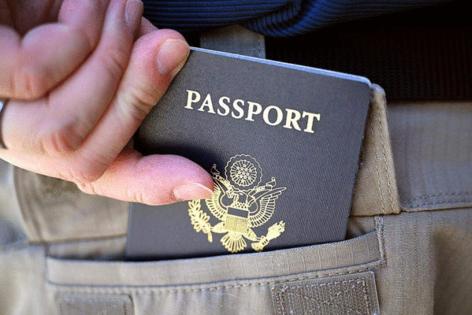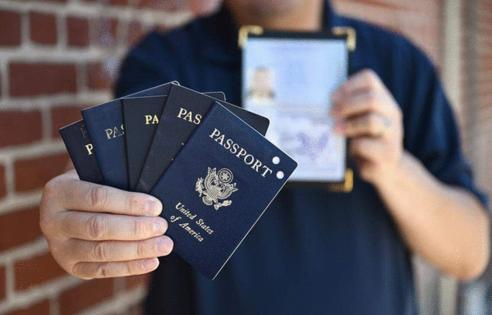Some Californians carry passports in fear of ICE. 'We're being racially profiled'
Published in News & Features
FRESNO, Calif. — With the Trump administration’s directive that federal immigration agents arrest 3,000 people per day as part of a massive deportation campaign, some U.S. citizens are taking the extraordinary step of carrying their passports to avoid being profiled and detained.
For some Fresno residents, it’s an obvious choice. They say it’s the simplest way to prove citizenship in case of encounters with U.S. Customs and Immigration Enforcement agents.
For others, the decision is rooted in fear and distrust of the federal government and law enforcement due to being erroneously profiled for being Latino in the past.
“This is the first time I renewed my passport not for travel but for proof of citizenship,” said Fresno resident Paul Liu.
There’s growing concern about how ICE is ensnaring citizens in its deportation operations. A 2021 report from the U.S. Government Accountability Office found that, between 2015 to 2020, ICE arrested 674 U.S. citizens, detained 121 and deported an estimated 70 citizens.
Liu’s passport expired in January 2024. He renewed in February, one month after Trump took office.
Liu, 52, said his decision is inspired by his family’s experience in China. His great-uncle sympathized with the Nationalist Party that opposed the Communist Party of China. As far as Liu’s family knows, his uncle was disappeared by the government and wasn’t seen until 30 years later by a sister who recognized him working on a chain gang in the city.
“I see what an oppressive regime has done to our family,” he said. “I’m just convinced that now, the onus is on anyone who’s not white, male and MAGA to prove they belong in this country.”
The REAL ID or a valid passport is required for domestic travel as of May, but American citizens are not otherwise required to carry a national form of identification.
To avoid potential detention and arrest, immigration lawyer Olga Grosh of Pasifika Immigration Law Group, LLP said people can consider having evidence of valid immigration status handy, or a copy of these documents in your wallet if concerned about about loss or theft.
“But does a citizen have to live in fear of being kidnapped by their own government?” Grosh said. “There has been a shift from it being the government burden to show to a judge that a person should be detained under the law, to citizens proving that they shouldn’t be detained by unidentified agents.”
The Department of Homeland Security and ICE did not respond to requests for comment for this article.
History teacher carries passport to Home Depot ‘just in case’
Fresno resident Andres R. has visited Home Depot about six times in the past month for home renovation work. The home improvement store has been a target for multiple immigration enforcement operations statewide.
So, he carries his passport in a crossbody fanny pack with his keys, wallet and glasses “just in case.”
Some American citizens have been questioned and detained in these operations and he worries about being profiled. (Andres asked that his last name not be used due to concerns of drawing attention from the federal government.)
“Even though I’m a law-abiding citizen, I’d rather be safe than sorry,” he said.
Andres R., 50, the son of naturalized citizens from Mexico who entered the country illegally, said he started carrying his passport when he traveled to Los Angles for a Dodgers game on June 21 at the insistence of his wife.
He’s still carrying it, and is the only one in his family to do so. As a history teacher, he thinks about instances of Japanese-Americans being sent to internment camps, such as Manzanar, during World War II and the Los Angeles raids in the 1920s and ‘30s that resulted in the deportation of more than 1 million Mexicans and Mexican Americans.
“We need to voice our disagreement. Even though we’re scared we have to,” he said.
Mother, son carry passports because of profiling, memory of 1980s raids
Born and raised in Fresno, Christian, 39, is used to being questioned by authorities about his identity. Growing up on the east side of town, he and his friends were into skateboarding in the early 2000s. He recalls being detained by Fresno police officers given the Fresno Bulldog gang activity at the time.
“If you were young, Latino, wore red or had your head shaved, you were expecting to be messed with,” Christian said. (He asked his last name be withheld for fear of professional retaliation and political persecution).
Christian later moved to Tennessee for grad school, where people would ask him, in an inhospitable tone, if he was Muslim.
So, when Christian attended the June 14 No Kings Protest in Los Angeles, he decided to bring his passport.
“We’re being racially profiled,” he said.
Christian’s mom, a naturalized citizen from Jalisco, Mexico who crossed the border illegally in 1979, also carries her passport. She doesn’t leave her house much these days and recently skipped a doctor’s appointment for fear of “La Migra.”
“It’s very scary to go out without documents,” she said in Spanish. (She asked that her name not be used for fear of deportation).
The 68-year-old remembers hiding in laundry bins in Fresno garment factories and packing houses during Fresno area workplace raids in the 1980s. The border was more porous back then, and it was easier and cheaper to cross back over to come back for work. Immigration agents weren’t as aggressive as they are today, she said.
Christian worries about what would happen to his parents, who don’t speak English, if they are detained by an ICE agent who doesn’t speak Spanish.
The fact that some U.S. residents are carrying their passports these days, he said, speaks to a troubling sentiment.
“I think it shows a deeper feeling of never really feeling part of the country — not for lack of not wanting to be,” he said.
_____
©2025 The Fresno Bee. Visit fresnobee.com. Distributed by Tribune Content Agency, LLC.










Comments